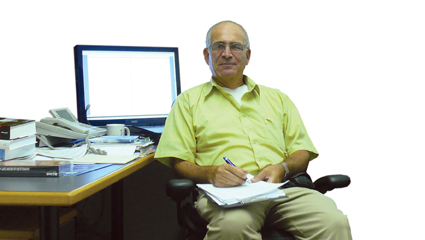Prof. Dan Dolev considers himself lucky: A new scientific field that perfectly suited his academic interests emerged just when he was studying for his Ph.D. at the Weizmann Institute in the late 1970s. Computer science combined the use of mathematical reasoning and rigorous logic with the opportunity to apply both in practice – precisely the features Dolev found most compelling.
Dolev first became interested in science while in elementary school, thanks to a teacher who instilled in him curiosity and a love of nature. He was initially drawn to physics, then switched to mathematics. It was during his graduate studies in mathematics that he took a few introductory courses in computer science at the Feinberg Graduate School, the first academic institution in Israel to award degrees in this discipline. Dolev fell in love with the field. “I was captivated by the prospect of working on mathematical theory for the sake of its practical applications, not only for its theoretical beauty,” he says.
Since then, he has been focusing on research topics of relevance to real-life situations. In his doctoral studies, he investigated the synchronization of parallel computational processes, which in real life could help prevent several simultaneous processes from interfering with one another.
During postdoctoral studies at Stanford University he became acquainted with a broad range of computer science investigations and turned his attention to computer systems. Now, as a professor of computer science at the Hebrew University, he investigates the various theoretical and practical aspects of such systems. His applied projects have included the design of techniques that allow computer networks to function after they have been partially damaged – for example, as a result of a terrorist attack. Reflecting on his choice of career, Dolev notes that his initial encounter with computer science occurred largely by chance. “I happened to be in the right place at the right time,” he says.
